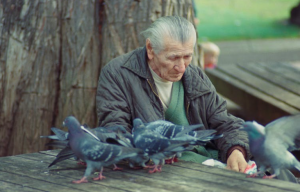What is Paranoia in Seniors?
We all have that one friend we jokingly call paranoid—maybe they are always the one freaking out about not finding a parking spot or is worried someone will have the same outfit as them at a party. But there’s a very distinct difference between being a drama queen and suffering from psychosis.
The National Institute of Mental Health (NIMH) defines psychosis as conditions that affect the mind where there has been some loss of contact with reality. Someone suffering from a psychotic episode has a difficult time distinguishing between what is a reality at that moment and what is not. NIMH describes delusions and hallucinations as some of the main symptoms of psychosis, as well as nonsense speech and behavior.
Paranoia affects 23% of seniors. Paranoia in seniors can manifest itself as believing someone is following them or breaking into their home. Normal age-related health issues like loss of vision and hearing trigger the occurrence of senior delusions and hallucinations. Certain medications, alcohol, and Alzheimer’s and Dementia have also been shown to worsen paranoia in seniors.
The main concern with senior paranoia is safety. Often a senior’s delusions or hallucinations can appear scary or threatening to the senior, causing them to want to flee their home or become aggressive, which can lead to falls and other injuries.
Keep their doctor updated and informed on any new or worsening symptoms of paranoia, giving them examples of recent episodes. Keeping a journal helps to track and record episodes to help you give the best possible information to the doctor.
It may be time for additional help. Due to safety concerns, it may not be best for your senior to be alone throughout the day. At-home care or assistance may be necessary. A 24/7 caregiving service or group adult foster care program will ensure that your senior is getting the care and attention they need while still maintaining a sense of independence.
Avoid confrontation. The worst thing you can do is argue or reason with your senior when it comes to their delusions or hallucinations. Remember, the individual cannot distinguish between what is reality and what is not. Reassure your senior they are safe and validate their emotions rather than trying to convince them that what they’re experiencing is not real.
Paranoia in seniors is treatable. Therapy has been shown to help paranoid seniors understand and redirect their emotions, like palliative care. Depending on the severity, a doctor may prescribe medications like antidepressants to help treat the paranoia.
Paranoia, no matter what age you are, is scary and unpredictable, and will only worsen with time. Be sure to stay on top of your senior’s psychosis and don’t ignore the issue. To begin getting 24/7 care for your senior, start by learning about our Adult Foster Care and Group Adult Foster Care programs.







